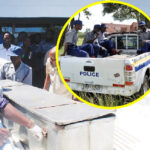A wave of fear has swept through the Zimbabwean community in South Africa as the country’s immigration authorities embark on a stringent crackdown on undocumented migrants, conducting door-to-door searches and intensifying inspections at businesses and workplaces. The move, driven by the new Home Affairs Minister, Leon Schreiber, has left many Zimbabweans living in constant fear of being apprehended and deported.
The recent crackdown, which has seen immigration officials targeting spaza shops, restaurants, farms, and mines, has been described by some as a “witch hunt”, leaving undocumented Zimbabweans feeling vulnerable and uncertain about their future. The heightened scrutiny has triggered a sense of unease, with many fearing that their lives in South Africa, built on hard work and resilience, could be abruptly shattered.
“We are worried that there seems to be an increase in the number of arrests targeting undocumented migrants,” said Ngqabutho Nicholas Mabhena, Chairperson of the Zimbabwe Community in South Africa. “While the law states that undocumented individuals must be arrested, we do not contest the right of the South African Police Service (SAPS) and immigration officials to arrest undocumented people.”
However, Mabhena raised concerns about the manner in which these arrests are being conducted, alleging that they are being used as a fundraising tactic by the authorities. “There is now a new tendency where people are rounded up at their places of work or residences and taken to police stations where they are asked to pay hefty sums of money – R3,500 or so – for their release,” he said. “It appears as if migrants are being used by SAPS for fundraising purposes.”
Mabhena’s concerns echo the anxieties felt by many undocumented Zimbabweans, who are struggling to make ends meet in a challenging economic environment. The fear of being caught and deported adds another layer of stress to their already precarious lives.
“I came to South Africa seeking a chance to rebuild my life,” said Hardlife Shoko*, an undocumented migrant from Shurugwi who works odd jobs and sometimes on farms. “Exploitation is real there because the farm owners say we don’t earn much since we don’t pay rent while working there.”
Shoko’s account highlights the complex realities faced by many undocumented migrants, who often find themselves trapped in exploitative situations due to their precarious legal status. The fear of deportation, coupled with the lack of legal protection, leaves them vulnerable to exploitation and abuse.
Nothando Sibanda*, who works as a waitress at an eatery, pleaded for understanding and compassion from the South African authorities. “We understand that the law must be enforced, but can they also understand our background and lives? We just need to work, survive, and support families back home,” she said.
Sibanda’s plea reflects the human cost of the immigration crackdown, highlighting the real people behind the statistics. The crackdown is not just about enforcing immigration laws; it is about the lives of individuals and families who are caught in the crossfire.
The South African government has defended its actions, stating that the crackdown is necessary to address illegal immigration and its associated challenges. Home Affairs Minister Leon Schreiber, in his maiden speech in Parliament, stressed the need for a sustained and collaborative approach to combating illegal immigration.
“This problem needs to be tackled in a sustained, integrated, and collaborative way,” said Schreiber. “In the coming year, Home Affairs will increase the number of inspections at restaurants, spaza shops, farms, and mines by over 50 percent to take action against people illegally employed, including through deportations.”
Schreiber’s statement underscores the government’s commitment to enforcing immigration laws, but it also raises questions about the impact of such a stringent approach on the lives of undocumented migrants. While the government may be justified in its efforts to curb illegal immigration, the human cost of these measures cannot be ignored.
The crackdown has also extended to landlords, with Gauteng Social Development Member of the Executive Council (MEC) Faith Mazibuko issuing a stern warning to those found harbouring undocumented tenants.
“Residents across South Africa who have undocumented tenants need to take immediate action. When the police commence with the raids, arrests will be made, and it will include the landlord. It is your duty as a landlord to request all documents of your tenants,” Mazibuko was quoted as saying.
This latest development has further heightened anxieties among undocumented Zimbabweans, as they fear that their landlords may be forced to turn them in to avoid facing legal repercussions. The crackdown has created a climate of fear and mistrust, making it even more difficult for undocumented migrants to navigate their lives in South Africa.
The Zimbabwean community in South Africa is calling for a more humane and compassionate approach to immigration enforcement, advocating for a system that allows undocumented migrants to regularise their status and contribute to the South African economy without fear of deportation.
“The 2010 example is a good one,” said Mabhena. “Those who did not have documents were granted them, and we saw a reduction in arrests of migrants, particularly from Zimbabwe.”
Mabhena’s suggestion highlights the potential for a more constructive approach to immigration management, one that balances the need for security with the recognition of human rights and the contributions of undocumented migrants.
The current crackdown has sent a strong message to illegal foreigners, but it has also created a climate of fear and uncertainty.












